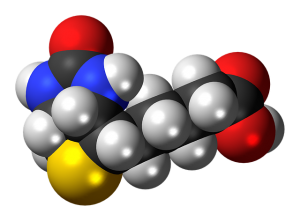Biotin supplementation may benefit the skin in cases of deficiency, but research evidence is lacking and deficiency is rare.

Biotin is a B vitamin needed for healthy energy metabolism. It is commonly used in beauty supplements, and has been suggested to help improve skin health by:
- Restoring biotin deficiency, which can cause dry skin, dermatitis, rashes, and other skin symptoms.
Overview
Vitamin B7 – better known as biotin – is a water-soluble B vitamin. Like the other seven B vitamins, it supports healthy energy metabolism by helping the body produce energy from food.
More specifically, biotin aids the function of enzymes that break down and use carbohydrates, fats, and proteins. This essential role is critical to the health of the nervous system, hair, skin, and nails.
Biotin supplements and cosmetic products are used to promote healthy skin, hair, and nails, making it one of the most popular “beauty” vitamins. These uses are explained by the fact that biotin deficiency can cause hair thinning, hair loss, brittle nails, dry skin, seborrheic dermatitis, and rashes. Outside of that, however, there are no studies demonstrating the effects of biotin supplementation on the skin.
In addition, biotin deficiency is rare because of its dietary abundance. Indeed, biotin is found in such widely-consumed foods as meat, fish, eggs, seeds, and nuts. In addition to this, research suggests that our gut bacteria can also produce biotin. 1 As such, there is some controversy about whether taking biotin can enhance skin, hair, and nail health for the average healthy individual.
Read more: Guide to energy supplements

Foods High in Vitamin B7
| Food | Serving Size | Amount per serving (mcg) |
| Beef Liver | 3 ounces | 30.8 |
| Egg (cooked) | Whole egg | 10 |
| Canned salmon | 3 ounces | 5 |
| Sunflower seeds | 1/4 cup | 2.6 |
| Sweet potato | 1/2 cup | 2.4 |
| Banana | 1/2 cup | 0.2 |
How Biotin Might Help With Skin Health
Restoring biotin deficiency
Scientific evidence suggests that the only way biotin supplementation can improve skin health is my restoring biotin deficiency. Symptoms of biotin deficiency include dry skin, seborrheic dermatitis, and rashes.2 However, it is important to reiterate that biotin deficiency is rare.
Biotin Popular Uses & Potential Benefits for the Skin
Biotin supplements are popularly used to support healthy skin, which includes fighting acne, eczema, dryness, and other common skin issues. However, there is lack of evidence about how effective biotin is for these skin conditions, and also, these benefits might only be applicable to people with biotin deficiency, which is rare.
Since biotin deficiency can cause dry skin, rashes, and dermatitis (seborrheic dermatitis in particular), there is some scientific evidence to support these uses. However, biotin deficiency is rare and supplementation is not likely to have much effect on skin health and appearance in healthy individuals.
More importantly, there are currently no clinical studies demonstrating the effects of biotin supplementation on skin health.
Research
Human Research
Outside of a handful of old studies showing improvement of dermatitis and rashes in infants with biotin deficiency, there are currently no human trials demonstrating the skin benefits of biotin. 3 4
Dosage for Skin
- Standalone biotin supplements typically provide 5,000-10,000 mcg dosages, although some supplements come in smaller dosages (~ 1,000 mcg)
- Biotin is also available in smaller dosages in B-vitamin complexes and multivitamin products
- The most common dosage used for skin, hair, and nail health is 10,000 mcg (10 mg), because this dosage was used in research studies of biotin deficiency 5
- For people concerned with side effects such as acne, smaller dosages (1,000-5,000 mcg) are ideal
Available Forms
- Biotin supplements come in many different forms, including tablets, capsules, softgels, gummies, liquid, lozenges, and powder. However, all these forms use the same type of active biotin.
Supplements in Review Recommendation
- Biotin, 5,000-10,000 mcg for skin health.
There is no evidence that biotin supplements help the skin in healthy individuals. Biotin deficiency can cause skin issues such as dryness and dermatitis, which could in turn be improved by biotin supplementation. However, deficiency is rare and there are no clinical studies of biotin supplementation and skin health.
Dosages of 5,000-10,000 mcg are most common. If you do want to give biotin a try, we suggest starting with a dosage of 1,000 mcg, checking for side effects, and increasing to 5,000-10,000 mcg.
Leave a Reply